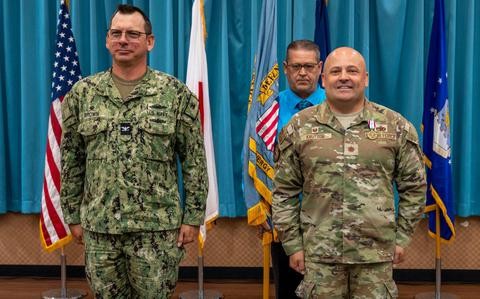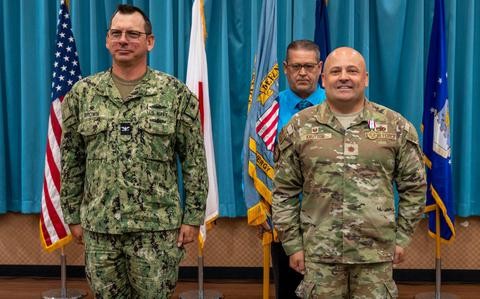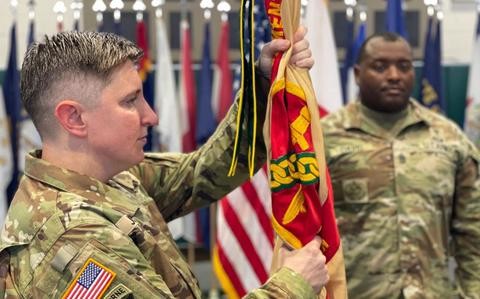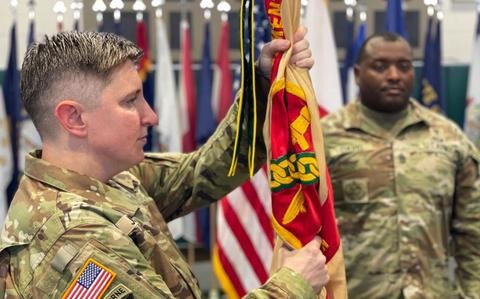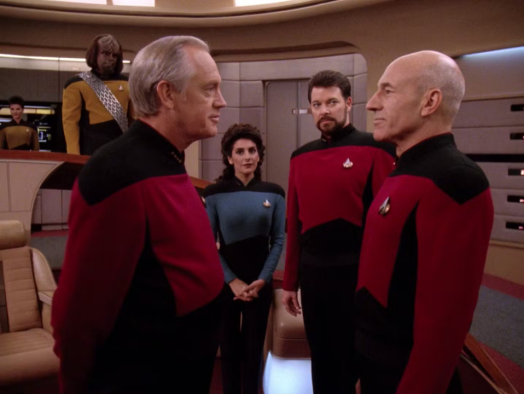https://www.alojapan.com/1306869/defense-logistics-agency-energy-okinawa-hosts-change-of-command/ Defense Logistics Agency Energy Okinawa hosts Change of Command #ChangeOfCommand #DefenseLogisticsAgency #EnergyOkinawa #news #Okinawa #OkinawaNews #沖縄 (Senior Airman James Johnson, 18th Wing Public Affairs) KADENA AIR BASE, Japan — U.S. Air Force Maj. Kevin Knutson, Defense Logistics Agency Energy Okinawa outgoing commander, and U.S. Air Force Maj. Dominic Baker, DLA Energy Okinawa incoming commander, participated in a change of command cere…
#changeOfCommand
Defense Logistics Agency Energy Okinawa hosts Change of Command
(Senior Airman James Johnson, 18th Wing Public Affairs) KADENA AIR BASE, Japan — U.S. Air Force Maj. Kevin Knutson, Defense Logistics Agency Energy Okinawa outgoing commander, and U.S. Air Force Maj. Dominic Baker, DLA Energy Okinawa inc…
#Japan #JP #Okinawa #changeofcommand #defenselogisticsagency #energyokinawa #news #okinawanews #沖縄
https://www.alojapan.com/1306869/defense-logistics-agency-energy-okinawa-hosts-change-of-command/
Change of Command: New leadership for USAG Okinawa
(Natalie Stanley, U.S. Army Garrison Okinawa) TORII STATION, Okinawa, Japan – U.S. Army Garrison Okinawa Lt. Col. Elizabeth Johnson, incoming commander, prepares to pass the garrison guidon during a Change of Command ceremony at Torii Station, Japan, June 18, 2025.
#Japan #JP #Okinawa #amry #changeofcommand #news #okinawanews #ToriiStation #usagokinawa #沖縄
https://www.alojapan.com/1306118/change-of-command-new-leadership-for-usag-okinawa/
https://www.alojapan.com/1306118/change-of-command-new-leadership-for-usag-okinawa/ Change of Command: New leadership for USAG Okinawa #amry #ChangeOfCommand #news #Okinawa #OkinawaNews #ToriiStation #UsagOkinawa #沖縄 (Natalie Stanley, U.S. Army Garrison Okinawa) TORII STATION, Okinawa, Japan – U.S. Army Garrison Okinawa Lt. Col. Elizabeth Johnson, incoming commander, prepares to pass the garrison guidon during a Change of Command ceremony at Torii Station, Japan, June 18, 2025. …
“Get it Done”: Adjusting to Transitions in Leadership Aboard the USS Enterprise
Star Trek: The Next Generation, Chain of Command (Paramount Television)In the United States Military, Change of Command ceremonies are formal yet simple affairs. The unit’s history is read, the colors or guidon are passed between leaders, and a few speeches are given, all encompassing a tradition that represents the official change in leadership from one commissioned officer to another (or noncommissioned officers during Changes of Responsibility). This seems like a fairly easy process on the surface, but the ceremony does not capture the difficulties both leaders and followers encounter when such leadership transitions take place. Unless you are actively involved in such a transition, one rarely gets to see the trials and tribulations that are bound to occur before and after the change of command, as the commander begins to exercise their authority and followers adjust to their new leadership style. The same is true in Starfleet during Star Trek: The Next Generation.
During “Chain of Command,” a two-part episode in season six, the crew of the USS Enterprise goes through such a transition as Captain Jean-Luc Picard relinquishes command of the ship to Captain Edward Jellico. The actions and behaviors of both Captain Jellico and the crew of the USS Enterprise stress the difficulties with leadership transitions and can provide examples of how to mitigate this adjustment period through understanding, adaptability, and communication. In this article, we will look at the leadership transition through the eyes of each of the participants, including their initial reactions and how they adjusted throughout the transition.
The William Bridges Transition Model captures the emotions and effectiveness both leaders and followers endure during a transitional period. While the initial period of a transition is met with negative emotions, such as denial or anger, this eventually leads to acceptance of the change, with hope and enthusiasm for the future of the team or organization. Although on a condensed timeline, both Jellico and the crew experience many of the emotions identified in the model. Jellico initially exhibits frustration and anger towards the crew, with his outlook leaning towards impatience and enthusiasm by the end of the episode. Lieutenant Commander La Forge displays denial and Commander Riker anxiety, but with each turning towards creativity and acceptance, respectively, as the mission ends. Both the Captain and crew exhibited the emotions in line with the William Bridges Transition Model, and even within the short timeframe, started becoming an effective team.
Captain Edward Jellico
Captain Edward Jellico was possibly named after the British Admiral of the Fleet John Jellicoe, who commanded the fleet in the 1916 Battle of Jutland with controversial results. Jellico, too, is a controversial figure among Star Trek fans, many of whom debate whether he was a lesser captain than Jean-Luc Picard. Jellico is clearly established as more of a stern and demanding commander than Picard. His catchphrase “Get it done!” when issuing orders contrasts with Picard’s friendlier “Make it so.”
Almost immediately upon boarding the Enterprise, Jellico demands significant changes to the ship’s systems and operations. He repeatedly justifies his demands by stating he needs the ship and crew combat-ready in a short time; Jellico has a pessimistic outlook on the upcoming negotiations with the Cardassian counterparts, and believes conflict is unavoidable. While Jellico’s time is indeed limited before the rendezvous with the Cardassians, he fails to make an initial assessment of what’s already working on the ship and what isn’t working.
Was Jellico an effective commander? He accomplishes the mission: hostilities with the Cardassians are avoided, Picard is released from capture, and despite some tension, neither side takes any serious casualties. Jellico gets results from his crew, but he ignores the emotional, mental, and physical cost of those results. He is difficult to judge because we only see him in the short-term context of preparing the ship for combat. It is likely his demanding leadership style would not be sustainable in the long term.
Captain Jean-Luc Picard
Captain Jean-Luc Picard is an experienced captain. The Enterprise is his second ship (following the Stargazer), and he has developed a clear identity as a leader that facilitates and enables mission command. Having commanded the Enterprise for five years at this point, the crew have both become comfortable under Picard and developed a (borderline inappropriate) degree of personal loyalty toward him.
Starfleet receives intelligence indicating the Cardassians are developing a biological weapon. Starfleet wants the weapon disabled, but their options are limited due to broader political sensitivities. As one of Starfleet’s few officers with the required experience and technical skills, Picard is selected for the classified high-risk mission that drives the plot of this episode. His relief from command is meant to publicly explain his absence from the ship. The mission fails: the biological weapon is shown to be a ruse, and Picard is captured while his companions, Worf and Dr. Crusher, manage to escape. Picard spends most of the episode in captivity, engaged in a battle of wills with his interrogator, a Cardassian named Gul Madred.
After relinquishing command but before departing on the classified mission, Picard is placed in a difficult position as both Riker and Jellico use him as a sounding board to complain about one another. After Riker’s initial disagreements with Jellico, Riker considers asking Picard for advice, but smartly doesn’t. Separately, a frustrated Jellico vents to Picard about Riker’s pride and stubbornness, and calls his competence into question. Picard vouches for Riker as a commendable officer, but Jellico doesn’t see much potential in Riker and doesn’t have time to “give him a chance” as Picard advises.
Commander William Riker
Among the Enterprise’s senior staff, Commander Riker has the hardest time adjusting to the leadership transition. Having served as the ship’s First Officer for the last five years, he has become very competent in his role yet very comfortable under Picard’s leadership. This creates conflict with Jellico, who is quick to make changes, has a different leadership style, and expects more out of his crewmembers when preparing for combat. This conflict begins as soon as Admiral Nechayev notifies the crew of the change of command. When Riker tells her there is no need to make Jellico the commander simply to conduct negotiations, she immediately counters that Jellico has the right experience negotiating with the Cardassians, adding, “No offense, Commander, but that’s not you.” This not only is a blow to Riker’s self-confidence, but also plants the seeds for his future resistance to Jellico.
Riker and Jellico’s first meeting initially shows promise, but, from Riker’s perspective, this quickly devolves once they begin to talk business. Friction begins when Jellico asks about the duty shifts, changes the number of shifts from three to four, and schedules an update with the department heads. Even with something as trivial as adjusting the number of shifts, it is seen as questioning the competence and expertise of not only the crew, but also Picard. Their relationship is further strained when Riker fails to implement the fourth shift into the duty rotation. Later, on the bridge, Jellico explains to Riker and Lieutenant Commander Data what he wants accomplished to make the ship more combat-ready. Riker and Data provide the associated risks with his course of action, which Jellico acknowledges as he reiterates his previous order. In this action, Riker shows his excellent qualities as the First Officer; he provides his commander with the risks associated with a particular course of action, while allowing the commander to make the decision and ultimately accept those risks.
In keeping with his role as First Officer, regardless of his rocky relationship with Jellico, Riker continues to serve the USS Enterprise to the best of his ability while maintaining his boundaries. When La Forge asks Riker to talk to Picard about all the changes that are being made on the ship, Riker is quick to acquiesce. Upon entering Picard’s quarters though, Riker changes his mind, accepting that Picard is no longer the ship’s captain and that he needs to comply with Jellico’s orders. Riker’s role becomes much more difficult, though, during the negotiations with the Cardassians, as Jellico does not provide him or Lieutenant Commander Troi with his specific negotiation tactics. This fails to create shared understanding between the three, and instead makes Riker believe Jellico is irrational and potentially unstable. This also creates problems later when Gul Lemec says they have captured Picard. Riker immediately asks if he is alive, which confirms Starfleet’s knowledge of the operation and undermines Jellico’s bargaining position with the Cardassians. This could have easily been avoided by Jellico explaining the overall bargaining strategy and what each officer’s role was in the process.
Jellico and Riker’s relationship collapses after Jellico says he will relay Gul Lemec’s proposal to Admiral Nechayev. Riker had already shown disapproval when Jellico refused to consider launching a rescue mission for Picard, but he becomes very emotional when Jellico refuses to acknowledge Picard was under Starfleet orders; this would make him a Prisoner of War (POW) and prevent him from being executed. Jellico asks if he is questioning his judgment, and Riker responds it is his responsibility as the ship’s First Officer to “point out any actions that may be mistakes by a commanding officer.” Jellico immediately relieves him. Riker is correct in his role and responsibilities, but there is a proper time and place for disagreement, which was not in front of other members of the USS Enterprise.
Jellico and Riker’s last notable interaction occurs in the latter’s quarters following La Forge’s recommendation that Riker fly the shuttle for a mission to enable Picard’s release from captivity. After some small talk, they “drop ranks” and tell each other exactly how they feel about one another, with Jellico telling Riker he is insubordinate, arrogant, and does not think he is a good First Officer. Riker responds by telling Jellico he is arrogant, close-minded, and needs to control everything and everyone around him. He further states Jellico does not provide an atmosphere of trust, doesn’t inspire the crew to go out of their way for him, and that he does not think he is a good captain. While this does not completely overcome their issues with one another, it clears the air enough for them to work together towards outmaneuvering the Cardassians and securing Picard’s return.
Although Riker is clearly not happy with Jellico or his leadership style, this does not stop him from continuing to serve in his best capacity as the ship’s First Officer. He certainly could have been more professional and tactful in his disagreements with Jellico, but he truly believed he was serving his role in the best interest of his captain (Jellico), his ship, and its crew. Given more time to connect with Jellico under different circumstances and a better understanding of his leadership style, Riker would have equally served as an excellent First Officer under his leadership.
Lieutenant Commander (Counselor) Deanna Troi
As the ship’s counselor, it is no surprise that Lieutenant Commander Deanna Troi is the most sensible of all the crew members in how she reacts to the leadership transition. Unlike most of the main crewmembers, she truly understands her role as an advisor and does not take offense (vocally, at least) when Jellico chooses not to take her advice or recommendations. When discussing how the change of command has affected the crew, Jellico states he has noticed some resistance, and Troi calmly responds it is more about uncertainty of leadership expectations after serving for so long under Picard. She suggests he and the crew both need more time to understand and adjust to one another; in preparing the ship for combat, this is a recommendation Jellico cannot support. While she may see this as unempathetic, she is looking at the situation through her role as a Counselor and not as a Starfleet Officer who should be supporting their leaders in preparing for combat. This is reinforced a moment later when Jellico tells her she should wear the standard Starfleet uniform when on duty, rather than civilian clothes. She looks visibly disappointed but complies with his orders without resistance.
The limited exchanges between Jellico and Troi show each truly understands their role and are doing it to the best of their ability. Jellico needs to prepare the ship for combat; thus, he acknowledges her advice yet cannot currently implement it due to time constraints. Although different from Picard’s presumed lenience on uniform standards, his calm yet direct order that she wear the standard duty uniform is reasonable, and she complies without any disagreement. Troi knows to provide the best possible advice to her commander, which she does, while still acknowledging the ultimate decision rests with him. Like a good staff officer, she provides the recommendations and the risks, but understands she is not the decisionmaker.
Lieutenant Commander Geordi La Forge
As the ship’s Chief of Engineering, Lieutenant Commander Geordi La Forge does not appreciate Jellico’s demands to change the workings of the ship’s power systems. These changes are framed as making the ship more survivable in combat, but Geordi feels his own expertise and recommendations are not being considered by Jellico. In frustration, Geordi vents to Riker about Jellico’s demands, and a defeated Riker says Jellico won’t listen to him.
Later, Jellico builds rapport with Geordi by discussing their shared prior experience as shuttle pilots attempting the “Titan’s Turn” maneuver. Perhaps if Jellico had this conversation with Geordi earlier, Geordi might have supported Jellico’s changes more enthusiastically. If we feel like our boss cares about us, we’ll care a lot more about the work he or she needs us to do.
Ultimately, Geordi (along with the entire engineering department) benefits and even flourishes from Jellico’s leadership, which is a “pacesetting” style that Geordi needed to push him out of his comfort zone. There is no growth in the comfort zone, and no comfort in the growth zone. Geordi takes umbrage at Jellico’s initial claims that the ship’s power systems are inefficient, but Data (being an android) unemotionally confirms that, although Jellico’s desired changes will require tremendous work, they are technically possible. Sometimes we are too quick to label a leader as unreasonable or toxic. While certain behaviors are obviously counterproductive – screaming, bullying, verbal/physical abuse, and so on – a leader with a vision that requires some effort to attain is not necessarily “toxic,” but a check on one’s own professional laziness and complacency. If the boss is not asking for anything illegal, immoral, unethical, or unsafe, good followers have an obligation to support their commander (while keeping him or her informed of risk).
Lieutenant Commander Data
Lieutenant Commander Data, the ship’s Chief Science Officer, is an android. He is incapable of emotion (during this part of the series, at least). He does not require food, sleep, or recreation, and theoretically could perform his duties indefinitely. Jellico – along with plenty of real-world commanders – probably wishes all his officers were just like Data!
While we shouldn’t wish for our people to become androids, Data does show some commendable qualities in this episode. He generates options for his commander and supports his decisions, treating his superior officer with professionalism and respect. Data is loyal to the captain of the ship, not necessarily the individual who occupies that position.
Commander (Doctor) Beverly Crusher
Of all the main crewmembers, Dr. Beverly Crusher, the ship’s Chief Medical Officer, has the fewest interactions with Jellico; Lieutenant Worf only directly communicates with him once during the episode, responding quickly with a simple and dispassionate “Aye, Sir.” After returning to the Enterprise, Jellico talks with Crusher while she and Worf are receiving medical treatment. He tells her to get some rest after reassuring her that she made the smart decision not to go back for a rescue attempt on Picard. Jellico shows concern for her situation and her well-being, including trying to give her confidence that she made the right decision to return to the rendezvous point. While enroute to Minos Korva, Jellico briefs his primary staff on their upcoming mission inside the McAllister C-5 Nebula. Crusher feels he is putting the crew at risk, “gambling hundreds of lives,” to which Jellico immediately shuts down further opposition, as the plan has already been approved by Starfleet. As he begins to give Crusher her orders, she interrupts him with her task to “have sickbay ready for the casualties you’re about to send me.” He responds that she is correct, but it is clear by her tone and body language she is against the plan due to its high risk. Jellico never revisits this dissent by Crusher, as he currently only cares about competent officers who can perform under combat conditions, even at the expense of them liking him.
Conclusions
We offer the above “empowerment scale” to contrast Picard and Jellico’s leadership styles. Picard is a great delegator. Over five years, the staff became very comfortable with Picard’s personality and expectations. They became comfortable with Picard’s technique of delegating tasks (and providing the authority and resources to accomplish those tasks), seeking recommendations from his senior staff, and building consensus. Something the authors have experienced in their own careers is the risk of over-delegating certain tasks to the point of abandoning them.
Conversely, Jellico is so hands-on, heavily involved, and “in the weeds” of all ship operations that he’s easily described as a micromanager. However, micromanagement, just like empowerment, is in the eye of the beholder. Maybe one officer flourishes under a commander who provides broad guidance and intent, wide “left and right limits,” and the latitude to accomplish tasks however subordinates see fit. Another officer might struggle under such a command style: Is the boss checked out? Why can’t he just tell me exactly what he wants? Incredibly, some people want to be micromanaged and may not be mature or experienced enough to take advantage of the freedom and flexibility that an empowering leader offers them.
We suggest there is no perfect place to be on this empowerment scale. As we frequently say in the military, this can be “METT-TC dependent” (METT-TC refers to the following variables: the mission, the enemy, the terrain, the troops, the time available, and civilian considerations). Leadership is liquid, and leaders can always move left or right on this scale depending on the time available, the criticality of the task in question, and the amount of trust and faith they have in their subordinates.
Successful leadership transitions, like successful application of the empowerment scale, are the responsibility of both leaders and followers. It is the responsibility of leaders to acknowledge they are the new member of the crew and part of their integration is the understanding of not only processes and procedures, but also personalities; it is equally the responsibility of followers to work just as hard for their new commander, providing honest feedback to increase understanding, and to recognize the new commander will lead differently than their predecessor. In short, both leaders and followers need to be understanding, empathetic, and adaptable.
At the episode’s end, Picard is released from captivity and regains command of the Enterprise. Jellico quietly departs with little fanfare, and all appears to have returned to the status quo, as was the norm for 1990s television. However, there were at least two changes that endured after Jellico’s departure: Troi wears a Starfleet uniform for the remainder of the series, and Picard’s pet fish, Livingston, is never returned to the captain’s ready room.
We encourage leaders to measure where they currently sit on the empowerment scale. Where do their subordinates need them to be, and where is their boss? There is no right answer, but we should at least demonstrate the care and self-awareness to ask those questions. As stated in Army Doctrine Publication 6-22 (Army Leadership and the Profession): the leader, the led, and the situation are consistent factors that affect the dynamics of leadership.
About the Authors: Lieutenant Colonel Ryan C. Cornell-d’Echert is an officer in the United States Army and currently serves as the Deputy J3 for the U.S. Military Observer Group (USMOG) in Washington, DC. He has taught at both the Logistics Captains Career Course and the Army Management Staff College and has served in multiple Brigade Combat Teams, along with the 71st Explosive Ordnance Disposal (EOD) Group. He is slated to assume command of the 71st Transportation Battalion at Fort Gregg-Adams, VA, in summer 2025.
Major Robert A. Calkins is an officer in the United States Army and currently serves as the Deputy G2 for the 101st Airborne Division (Air Assault) at Fort Campbell, KY. He has previously served as the S2 for the 101st Airborne Division Artillery and the Committee Chief for the Military Intelligence Captains Career Course, as well as the Executive Officer and Operations Officer for the 309th Military Intelligence Battalion.
The views expressed are those of the authors and do not necessarily reflect the official policy or position of the United States Army, the Department of Defense, the U.S. government, Starfleet, or the United Federation of Planets.
#challengesOfCommand #changeOfCommand #changeOfCommandInStarTrek #command #LeaderDevelopment #Leadership #Military #scienceFiction #StarTrek #USArmy
